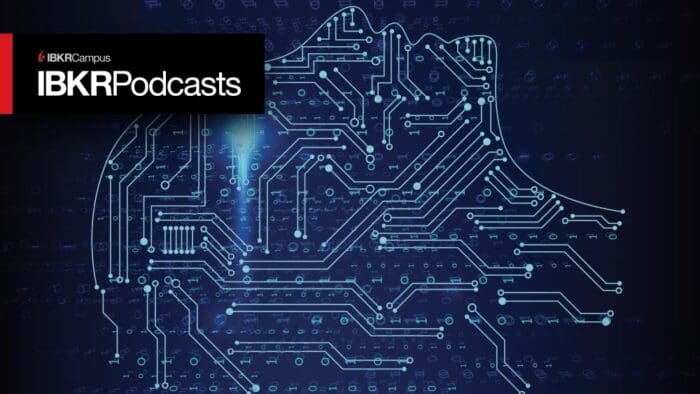Jan Szilagi, CEO and Founder of TOGGLE AI joins IBKR’s Senior Trading Education Specialist Jeff Praissman to discuss thematic trading versus stock picking and the benefits and drawbacks of both as well as AIs influence on each.
Contact Information:
Note: Any performance figures mentioned in this podcast are as of the date of recording (June 8, 2023).
Summary – IBKR Podcasts Ep. 89
The following is a summary of a live audio recording and may contain errors in spelling or grammar. Although IBKR has edited for clarity no material changes have been made.
Jeff Praissman
Hi everyone, welcome to IBKR podcast, I’m your host, Jeff Praissman, Interactive Brokers’, senior trading education specialist. It’s my pleasure to welcome back to the IBKR podcast studio, Jan Szilagyi– CEO of Toggle AI. Jan has spent most of his career managing global macro strategies and holds degrees in both mathematics and economics from Yale and completed his Ph. D in quantitative finance at Harvard. Hey Jan, welcome back and thank you for joining us!
Jan Szilagyi
Thank you for having me back. Great to be here.
Jeff Praissman
You know, in our previous podcast, we discussed the rise of the active retail investor as well as stock picking with the macro lens. Today, we’re going to discuss thematic trading versus stock picking and the benefits and drawbacks of both. But before we get started, just a quick note to our listeners to please rate and review our podcast; we really appreciate the feedback. Jan, if we could start with thematic trading and before even going into the pros and cons, could you go over with our listeners, what thematic trading is?
Jan Szilagyi
Yes, of course. So, you know, I think people who are passionate investors are often looking at not just individual businesses that are doing something exciting but may often be looking to invest in broader trends. And by broader trends, I mean, things like the rise of electric vehicles, perhaps green energy, space travel and so on. And so thematic investing is really a way to invest in not a single business, and therefore, betting on a single business doing really well with their product, but instead betting on an entire industry arising from nothing or a whole host of businesses ultimately doing something that hadn’t been done before and so on. So that’s how I generally think about thematic investing, really investing almost more on these macro trends as opposed to micro bends.
Jeff Praissman
So, you know, in other words, thematic trading sounds like instead of, say, investing in a single energy stock, you might be investing in either a whole group of stocks, indices, energy, ETF or something like that.
Jan Szilagyi
That’s right, I think, probably indices are the oldest form of thematic investing. If you didn’t want to invest in anything in particular, but you just thought ‘, OK, well, the stock market generally does well over time,’ that was certainly a theme that you could invest on. Over time, I think there was appetite to be a little bit more focused on some specific smaller trends rather than just the same overtime. And so, then you had ETFs which became naturally hugely popular because again it allowed the public to slice and dice the universe in ways that wasn’t possible before. And I think we continue to see that trend. The ability to offer investors a way to get really narrowly focused on some specific inter or intra industry trends.
Jeff Praissman
What are some of the benefits of thematic trading?
Jan Szilagyi
So, I think there’s several benefits. I think one very obvious one that shouldn’t be underestimated is that almost by definition, investors will invest in more than a single stock. And so, by virtue of doing so, they will have diversified their portfolio just because they will minimize the probability that maybe they have bet on the wrong business and therefore lose their money even if they were correct on a market or a trend and so on. So, I think that’s probably the most understated, but I think important benefit. I think some of the more, let’s call them glamorous ones, are obviously the fact that it allows people to participate in the success of more than just the single business. So, to the extent that you don’t know who is going to be the winner in space travel or who is going to ultimately be the biggest electric car maker, you might as well invest in a number of them. And then even if you are a little bit more diversified, still hope that, overall, the payoff from that kind of investing will be much, much better than if you have been invested in the market as a whole.
Jeff Praissman
And of course, with any investment strategy, there’s always got to be cons or drawbacks. In your opinion, what are the drawbacks of using thematic trading?
Jan Szilagyi
So again, the kind of counterpoint to the downside risk that I mentioned as a benefit, is the fact that if you are looking for shorter term gains of some extraordinary magnitude, which I think amongst retail investors occasionally became very popular, that certainly is harder to do when you’ve spread your risk across 20 or 30 companies. I think the second thing is that especially if you’re doing more custom baskets rather than, let’s say, ETF’s, you may not be able to express it in any way other than actually buying the underlying stocks. And so again to the extent that you wanted to do any kind of derivatives or options and so on, I think that becomes harder the more customized the basket is, the larger the number of stocks.
Jeff Praissman
So, it’s really good if you want to sort of have that wide blanket of investments. But if you really want to, we’ll get to obviously stock picking, which is in this name, if you want to kind of narrow or thread the needle, you know, it’s sort of more of not a great investment strategy, but if you want to kind of have that spread out approach it seems like thematic trading is the way to go. And before we get into stock picking, what type of investor or maybe, more appropriately, investor situation in your opinion, is it best suited for, and has this become more popular in recent years?
Jan Szilagyi
I think thematic investing has become more popular in part because vehicles have been created that enabled it right? So, before ETFs, the choice really was between investing in the index and then single stocks. And then I think with the creation of ETFs, I think there was an absolute explosion of the ability to now suddenly invest in consumer stocks or China exposed stocks and so on. And I think now with the advent of technologies such as direct indexing and so on, I think we’re seeing even more of a refined approach to this kind of thematic investing. And by the way, it doesn’t always have to be what you would call active thematic investing. In other words, of course, one way to think about it is that you say I would like to be Invested in, you know, stocks that are going to benefit from colonization of Mars, but then the other one is to say I’d like to invest in the entire index, except for fossil fuel related companies. And so, you can take away a particular theme that also is to an extent, thematic investing, I guess more of a subtractive thematic investing. But with fractional investing or fractional stocks, rather, I think the popularity and the ability of individual investors to participate in this has really grown because again, you can invest even just $10 in any one share through fractional shares. Then, it becomes much easier to put together a basket of five or ten stocks.
Jeff Praissman
In our, you know, last podcast, we discussed stock picking through a macro lens. But regardless, if you’re using a macro, micro lens, we just discussed for stock picking, the name really is a definition. If you’re picking an individual stock or individual stocks. But we’ve also discussed AI and retail investing in a previous podcast before that, and it seems the amount of investment tools available that you sort of hinted to just now, like through companies like Toggle AI like your new Toggle AI chat and also IBKR suite of free investor tools which include your copilot, align perfectly with stock picking. Would you agree to that that it’s really kind of sped up the process or maybe leveled the playing floor a little bit?
Jan Szilagyi
Yeah, 100%. I mean, I think one key challenge that confronts anybody who wants to do stock picking is that there are obviously a lot of securities to choose from. And so, if you don’t have any tools such as the ones that are available through IBKR, you are effectively left with kind of trying to shine a spotlight in this vast universe of potential investments, and not necessarily having a good framework for evaluating this large number of potential trades. So, if I take Toggle as an example, we are able to highlight things that tell you not only about the most important driver for a particular security, but also, which of these might be more imminent than others? Because like with many other things in investing, timing is very important, when you enter in a certain security it can make a big difference to the ultimate outcome and the returns that you earn from it. And so having the ability to monitor a large number of securities and know where to focus is invaluable for anybody who has decided to do individual stock picking.
Jeff Praissman
So, it really seems like the benefits are you’re really able to kind of customize your portfolio a lot more, really drill down if you’re able to spend the time doing the research, you know. Individual stock picking may be a useful strategy for the investor, but what are some of the drawbacks of stock picking then?
Jan Szilagyi
I think probably the most obvious one is that it’s really, really difficult. We see that even professional investors that are tasked with selecting the best stocks from this ocean of available securities, overtime really have a hard time beating the overall market. And so, if you are an investor and thinking about where to put your money, you really need to have the confidence or the passion to want to go down that route, and I think we obviously have examples of people being able to do quite well in stock picking, but that usually requires an immense amount of dedication. It’s hard to pick stocks just on the basis of maybe spending 20 minutes a day reading the newspaper. It becomes, I think, a little bit easier with thematic investing, because you’re presumably investing on a 5-to-10-year horizon. So, you benefit from some of the same trends that generally lift the entire market, but if you are looking to do shorter, short term horizon individual stock picking, the idiosyncratic risk that that brings is tremendous and we’ve seen the period during the regional bank crisis. Many, many stocks got pummeled, even if their business was virtually intact, because people on the whole were concerned about the potential for our credit crunch. Therefore, the economy is contracting and so as a result, any business is doing worse than it was going to before.
Jeff Praissman
So, kind of to use maybe a sports analogy or sports cliche. It’s sort of, you know, thematic investing and your swinging small, but you may miss smaller or hit small, but if you’re stock picking, you’re swinging big, and you may hit big or miss big.
Jan Szilagyi
That’s right! And I think you know, there are people who truly enjoy making bets on the outcomes of individual businesses. There might be situations where you think ‘, OK, well, I think here is a truly revolutionary product that I think is going to take off,’ and so I’d like to be a part of that journey. And whereas other times it might be more about saying there is an industry that is going through a big, big secular change and I’d like to be a part of that. I think I don’t have the time to evaluate the management of the prospects of every individual business, but I think as a whole there is definitely a need and a demand and so this industry is going to satisfy it. So, it’s probably a less nerve-wracking approach to investing and yet still exciting. You’re still investing in something that is probably more enticing than saying ‘, Oh well, you know what,’ overtime there’s an equity risk premium, so I’ll just be harvesting that by investing in the S&P 500.
Jeff Praissman
I’m going to pivot over to a subject that I know near and dear to your heart as well as mine, AI, and how can, you know, AI be a game changer for both types of investing. You know, given the current tools available as well as what you think that you know the near future could hold for traders and investors.
Jan Szilagyi
So I think some of the benefits of AI specifically as it relates to large language models, which is where most of the excitement is at the moment, I think we are probably still even not aware of, but the most obvious ones that we already are and I think a lot of people have tests that is the ability to ingest a very large amount of information and summarize it in a way that you or I can get through very, very quickly. The reality is that I think a lot of good ideas and a lot of both thematic as well as stock picking investments result from you reading something interesting, doing a little bit more investigation and then ultimately deciding that here’s an opportunity you’d like to be a part of AI in its current form. If you take some of these, GPT models are really well placed to assist in at least part of that workflow. Because take Chat GPT as an example, you are able to ultimately ask it to summarize some very interesting topics in a way that allows for further investigation that takes place in minutes as opposed to hours and days, right? You can say like what are the things that you think are most important currently in driving the labor market? And so, the system might say, well, these are some of the things that have been happening, these are the divergences we’re observing. Here are the industries that have typically seen or benefited from this and so that might be of interest to you if it’s not of interest to you, you end there and you move on to another topic. You can start talking about electric pickup trucks and so on, so it just allows for this kind of sampling of different topics and very, very quick investigation, almost like you’re having a conversation with a friend who’s happens to be reading everything every day.
Jeff Praissman
So, it really can, kind of discussed before, where the AI can really sort of speed up everyone’s knowledge base and help them kind of, you know. It’s not going to make the decisions for them, but it’s going to help them make the decision or get the information they need to make that decision that may be the best for them given their situation or at least given their opinion.
Jan Szilagyi
I think it’s going to instigate a kind of line of research. You’re still going to have to then be in the driving seat on this, right? The system won’t just say ‘, Oh well, you know for your portfolio, I think these three things are the best possible investments,’ it’ll be more along the lines of exploring and really thinking through a topic and relying on a GPT model to kind of provide the sources or thoughts around that particular theme. So again, before I was pivoting towards the labor market, but another example would be if you start to explore space travel and then think about ‘, OK, well, what kind of technologies go into building a rocket?’ Oh wow, there’s a whole host of suppliers that I could look into. So instead of then in the end just betting on the most visible aspects of this theme, which we, the companies, that actually launch rockets, maybe you start looking at some that are building the fuel for some of these rockets or like fuel tanks or components that’s on, there’s really quite a lot to explore. And I think AI is at a minimum and I’m not saying that’s the only benefit at all, just the one that certainly seems to be quite obvious at present. It will be a way for you to really poke around and survey the landscape in a much, much more efficient way than you would have otherwise. I mean, prior to that, we probably would have Googled all of these things, right? But Google returns kind of a host of different search results and you then need to go through a bunch of pages to see what’s relevant, whereas the benefit of something like a large language model is that it will summarize and articulate the gist of each one of these sources.
Jeff Praissman
So, kind of to go back even further than Google. In the past you’d have to go to a library and look up old, you know, newspaper printings or books. Then we have the Internet, you’re able to use Google and now AI being the present and the future, it’s going to even summarize this stuff quicker for you and get you more information.
Jan Szilagyi
That’s right, exactly.
Jeff Praissman
This was great. This was a great conversation. Once again, I want to thank you Jan for stopping by on our IBKR podcast. For more from Jan and Toggle, please go to our website under education to view previous webinars and podcast as well as keeping an eye out for any upcoming live events. I also want to remind everyone that you can find all of our podcasts on our website under education. Scroll down to IBKR podcast or on Spotify, Apple Music, Amazon Music, PodBean, Google Podcast, and Audible. Thank you for listening, until next time I’m Jeff Praissman with Interactive Brokers.
Join The Conversation
For specific platform feedback and suggestions, please submit it directly to our team using these instructions.
If you have an account-specific question or concern, please reach out to Client Services.
We encourage you to look through our FAQs before posting. Your question may already be covered!
Leave a Reply
Disclosure: Interactive Brokers
The analysis in this material is provided for information only and is not and should not be construed as an offer to sell or the solicitation of an offer to buy any security. To the extent that this material discusses general market activity, industry or sector trends or other broad-based economic or political conditions, it should not be construed as research or investment advice. To the extent that it includes references to specific securities, commodities, currencies, or other instruments, those references do not constitute a recommendation by IBKR to buy, sell or hold such investments. This material does not and is not intended to take into account the particular financial conditions, investment objectives or requirements of individual customers. Before acting on this material, you should consider whether it is suitable for your particular circumstances and, as necessary, seek professional advice.
The views and opinions expressed herein are those of the author and do not necessarily reflect the views of Interactive Brokers, its affiliates, or its employees.
Disclosure: ETFs
Any discussion or mention of an ETF is not to be construed as recommendation, promotion or solicitation. All investors should review and consider associated investment risks, charges and expenses of the investment company or fund prior to investing. Before acting on this material, you should consider whether it is suitable for your particular circumstances and, as necessary, seek professional advice.
Disclosure: Complex or Leveraged Exchange-Traded Products
Complex or Leveraged Exchange-Traded Products are complicated instruments that should only be used by sophisticated investors who fully understand the terms, investment strategy, and risks associated with the products. Learn more about the risks here: https://gdcdyn.interactivebrokers.com/Universal/servlet/Registration_v2.formSampleView?formdb=4155
Disclosure: Options Trading
Options involve risk and are not suitable for all investors. For information on the uses and risks of options, you can obtain a copy of the Options Clearing Corporation risk disclosure document titled Characteristics and Risks of Standardized Options by going to the following link ibkr.com/occ. Multiple leg strategies, including spreads, will incur multiple transaction costs.














Thank you for sharing your thought process, Munz.